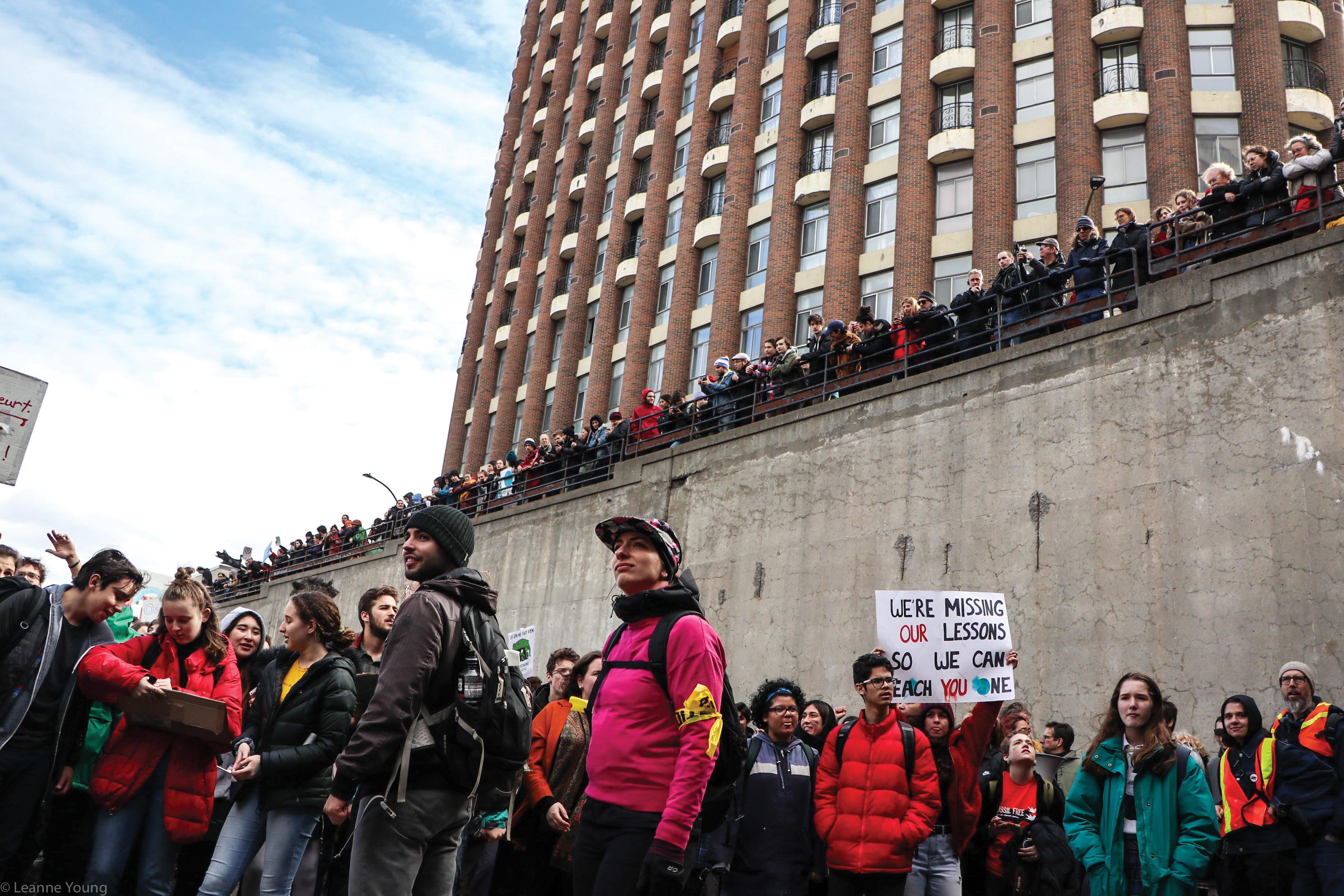Over 150,000 protesters, including university, CEGEP, and primary school students, joined the Montreal march for climate justice on March 15. The march, organized by the student movement La planète s’invite à l’Université, was one of more than 2,000 of its kind in 125 countries. Around 1,500 McGill students attended the McGill Walkout for Climate Justice demonstration held in front of the Arts Building, later joining a coalition of delegations from other universities and CEGEPs for the main demonstration at Jeanne-Mance Park.
The McGill Walkout’s organizers made three demands of McGill University: That it publicly acknowledge that fossil fuel companies cause grave injurious impacts on humans and the natural environment, that it immediately divest from fossil fuel companies, and that it urge the federal and provincial governments to implement the United Nations Declaration on the Rights of Indigenous Peoples (UNDRIP), which states that Indigenous peoples have the right to conserve and protect the environment. Further, the organizers called on the provincial and federal governments to implement an emergency climate action plan.
Jacqueline Lee-Tam, U1 Environment and Economics and one of the organizers of the McGill walkout, sees no excuse for McGill to postpone divestment.
“[Divestment] is a first step, and it is not radical,” Lee-Tam said. “Entire cities, states, and countries have divested. It is more than possible, and higher returns are being seen in fossil-free investments.”
Lee-Tam believes that declaring a climate emergency is the only way to prevent further irreversible climate destruction and that youth voices are essential to bringing about policy change at the international level.
“What would be radical would be to be complacent on this issue, to not act,” Lee-Tam said. “It’s our future, that’s the whole point of the youth [movement]. We’re taking the power back to have a say in what our future will look like.”
Alex Allard-Gray, member of the Listuguj Mi’gmaq First Nation and outreach administrator for the Indigenous Health Professional Program at McGill, explained that students need to collectively mobilize to amplify their voices.
“Students are very future-minded,” Allard-Gray said. “They’re not only learning about [climate change], but they’re experiencing a lot of these changes first-hand. A lot of us are not in decision-making roles, and it feels out of our hands. That can feel like a very hopeless environment, but, by coming together in these large groups and showing solidarity for [wanting] to change how we are [treating] the environment, it makes our voices heard.”
Allard-Gray pointed out that Indigenous communities often shoulder the most serious consequences of climate destruction.
“There have been constant promises of things to come, and it feels like lip service,” Allard-Gray said. “When [Trudeau’s government is] working with Indigenous peoples, we want to feel included. We want to feel as if we have a say when it comes to what is being done in our territories [….] Governments are going to have to start respecting Indigenous access to land. Consultation should not be a chore.”
Mostafa Henaway, a community worker at the Immigrant Workers’ Centre, explained that climate change disproportionately harms the global south, driving mass displacement and migration.
“This is the natural outcome of a system where profit exceeds everything else,” Henaway said. “[Of a system where] where profit exceeds our democracy, our humanity, Indigenous peoples’ rights […] to self-determine, the right for people to have decent and living jobs, […and] for people to not be displaced on their lands. It’s a crisis for all of us, but we’re going to make it a crisis for them.”
Many elementary and high school students were present at the Montreal March. Zoe Desharbes, a student at Villa-Maria elementary school, explained that it is important for children to make their voices heard because climate change will impact their futures the most.
“We’re here today because [the] climate is changing [and] the planet is dying,” Desharbes said. “It was really nice to see how many people came today. It’s a shame that they didn’t cancel school so that we could all come out.”








